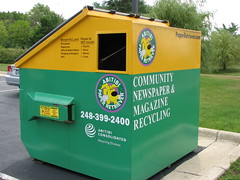Recycling tips for Startups and SMEs

Whenever I think of recycling, the images in my head get confused. In the late 90s, recycling was for those who were very organized, and involved family trips loaded up with carefully labeled bin bags. I do remember there being an incredibly good feeling when throwing empty glass bottles specifically, into huge tanks in the car park of a local supermarket. As a student, recycling almost became a competition with other ‘eco friendly super cool’ flats until we got to the rather sticky issue of who was going to actually lug precariously loaded boxes od newspapers down to an obscurely located recycling point. And now, as a young professional, I’m increasingly bamboozled by the sheer quantity of material I’m required to recycle (literally, at risk of being fined), and the number of bags, boxes and dividers, that are permanent fixtures in my home life to sustain this new world order.
You can imagine my intrigue therefore, when Lombard Recycling was suggested to me as a group worth looking into for Start Up Magazine. Lombard began in 1990 and is now a leading recycling group in the UK. Lost in my own memories of recycling, I’d actually forgotten that indeed, the disposal of paper is a viable business issue and one that, in an age that values and demands we keep an eye upon environmental responsibility, cannot be allowed to slip.
Indeed, if you are a small business entrepreneur, you’re not going to want to build a business if you can’t be safe in the knowledge that there will be a next generation to pass it onto.
Currently, most paper products are sent to landfill which take a significant period of time to break down. The decomposition process subsequently releases methane gases that are a contributory factor to the greenhouse effect. However, Lombard are tackling that by limiting the distance between the mills where they shred the paper, and the depots to which that paper is sent for recycling. That reduced carbon footprint at the source is indicative of a level of detail that is at the bedrock of this group.
Coming from a publishing background also, and as someone with a love of books, notebooks, stacks of paper and a truly irrational habit of buying stationery ‘just because it’s so pretty’, it got me thinking ‘how on earth does this group manage the sheer physical paper quantities in the mix?’. Lombard employ a subtle yet effective method of shredding paper, which leads to a sharp benefit side effect where confidential waste items can be destroyed whilst helping in our global battle to protect trees. In an age of consumer security, data protection and information crime, Lombard allow any company who needs to adhere to the Data Protection Act 1998, a means to access the disposal process. (The Act requires companies to provide sufficient guarantees of security in an environment where confidential information is being destroyed). It’s something I’d consider not just for the safety and peace of mind of my own clients, but also knowing that by reducing those huge paper pillars occupying my office, I’m doing my valid bit in the global environment protection campaign.
So, next time you stroll past the ‘Confidential Waste’ bucket in your office, don’t write it off as ‘some other unknown service’, but give it valid place as a worthwhile and valuable business cornerstone.
Related articles
- 5 Recycling Tips for the Average Consumer (thestartupmag.com)
- Formisimo Analytics for your web forms, an interview with Al Mackin (thestartupmag.com)
- Mistakes to Avoid with your First Business (thestartupmag.com)
